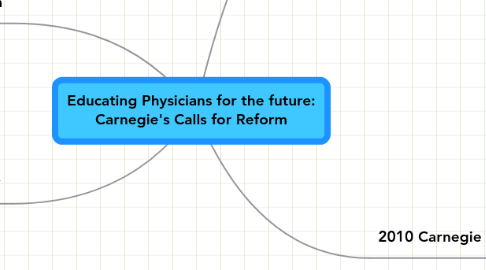
1. David M. Irby, PhD
1.1. Thank you very much, your presentation was nice!! - PdR, Junior Doc
2. Reform of education
2.1. Flexner report
2.1.1. Great variability
2.1.2. Lax admissions standards
2.1.3. Passive learning, anemic curricula, poor facilities
2.1.4. faculty of practitioners
2.1.5. no accreditation, certification or residency training
2.1.6. Structure recommandations
2.1.6.1. Picture will be added
2.1.6.1.1. European Situation
2.1.6.1.2. US Situation
2.2. document that wishes to follow onto this
2.2.1. 2010 - Educating physicians - a call for reform of medical school and residency, Molly Cooke, David Irby, Bridget O'Brien
3. 2010 Carnegie Study
3.1. Site visits
3.1.1. Research universities
3.1.2. rural universities
3.1.3. Focus
3.1.3.1. clinical education
3.1.3.1.1. clerkships
3.1.3.1.2. residency programs
3.1.3.2. preclinical
3.1.4. Amazing variability among departments within universities with regards to innovation
3.1.4.1. data gathering
3.1.4.1.1. interviewws
3.1.4.1.2. focus groups
3.2. Core recommendations for the future
3.2.1. Standardization and individualisation
3.2.1.1. Outcome focus
3.2.1.2. Various assessment
3.2.1.3. Competency frameworks
3.2.1.3.1. ACGME-USA
3.2.1.3.2. CanMEDS - Canada
3.2.1.3.3. Tomorrow's Doctor - UK
3.2.1.3.4. Good Doctor - Sweden
3.2.1.4. American boards of Internal Medicine
3.2.1.4.1. Milestone project
3.2.1.5. Layered individualization
3.2.1.5.1. Fixed duration assignments
3.2.1.5.2. Learner engages in progressively greater complexity as competencies attained
3.2.2. integration
3.2.2.1. Connect knowledge with experience
3.2.2.2. Enable multiple forms of reasoning
3.2.2.2.1. Analytical reasoning
3.2.2.2.2. Pattern recognition
3.2.2.2.3. Creative and adaptive reasoning
3.2.2.3. Examples
3.2.2.3.1. Early clinical immersion
3.2.2.3.2. Longitudinal integrated experience
3.2.3. habits of inquiry and improvement
3.2.3.1. Focus on excellence and innovation
3.2.3.1.1. Beyond routine expertise: Dreyfuss model
3.2.3.2. Slide
3.2.3.2.1. Develop habits of continuous learning and innovation
3.2.3.2.2. Engage in deliberate practice with feedback
3.2.3.2.3. Inquiry/improvement
3.2.4. identity formation
3.2.4.1. Formation
3.2.4.1.1. Process of taking on identity
3.2.4.1.2. Commitment to values, dispositions and aspirations
3.2.4.2. Learned through
3.2.4.2.1. participation in a community of practice
3.2.4.2.2. Role models
3.2.4.2.3. Coaching
3.2.4.3. Strategies of formation
3.2.4.3.1. Courses
3.2.4.3.2. rituals
3.2.4.3.3. codes of conduct
3.2.4.3.4. Self-assessment
3.2.4.3.5. Reflection
3.2.4.3.6. planning
3.2.4.3.7. Applause - Comment PdR
